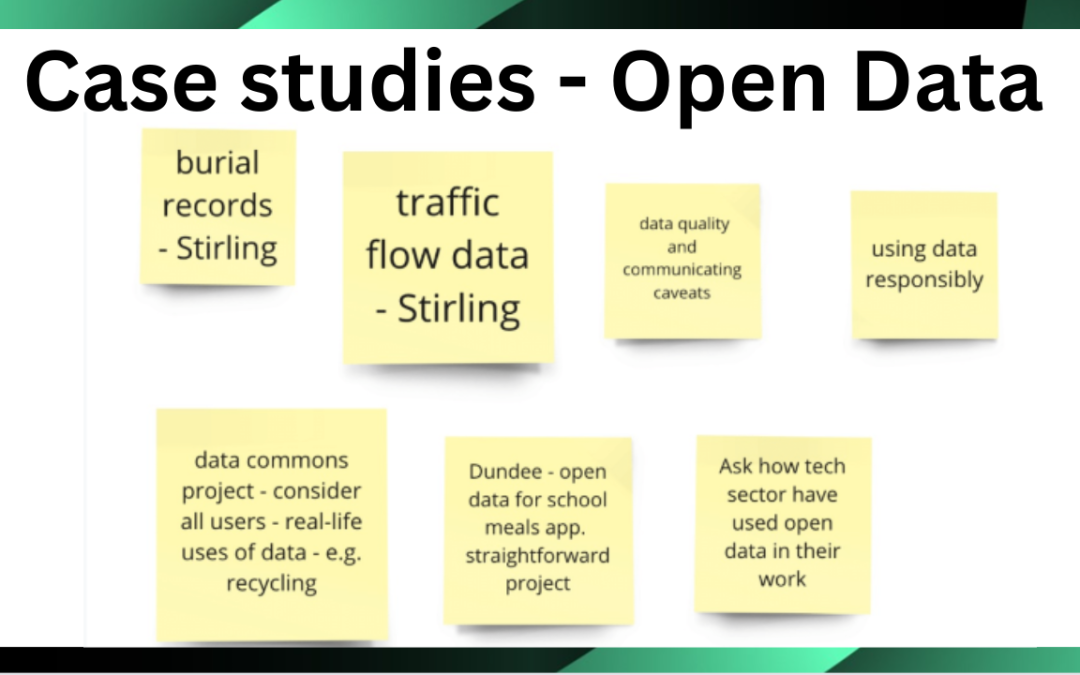Open Data – Encouraging case studies in Scotland
Coffee. Check. Biscuits. Check. Pick session at SODU to attend. Check.
It was the afternoon of Sunday 6th September and I was attending the Scottish Open Data Unconference (SODU) conference online. I had four sessions to choose from and the one that tempted me most was titled “Case Studies in Scotland – Value Gained and Resourced Involved”.
If you’re not familiar with the phrase ‘open data’, then this article by Karen Jewell will give you comfort that you are not alone.
So what is open data? According to the Open Data Institute, “open data is data that’s available to everyone to access, use and share.”
I chose the case studies session as I wanted to hear:
- how Scottish companies and organisations are consuming/using open data, and
- what data originating in Scotland has been made open to the world
Essentially, I wanted to be inspired!
Scottish case studies
Pen at the ready, I started to take notes on some interesting projects:
- The opening of burial records in Stirling has had the unforeseen benefit of an increase in tourism with people travelling to the area to visit graves. Previously an individual may not have known in which cemetery nor where within the cemetery a relative’s grave was located.
- In Dundee, a primary school was trialling an Alexa app to help students make healthier food choices from data made available on school dinners. More information here.
- Opening up data on taxi licences (which provides details of modifications to cars) has allowed apps to be created to let those requiring additional support, such as wheelchair access, to know where to find these taxis.
- There is a current project analysing traffic flow behaviour patterns from open data produced by Stirling council. Curiously, this will show how traffic behaviour has/has not changed since the first covid lockdown in March.
- There is an ongoing Data Commons Scotland project which uses open data to understand waste management and recycling behaviours. More information here.
Kudos for those using the data in this way, I thinks it’s fantastic. But as for the session itself I expected to hear more case studies, more examples coming thick and fast at me but it kind of petered out.
Given there is already data out there which is open, why was I not hearing more examples?
Value gained versus resources involved
Which came first the chicken or the egg? That’s what sprung to my mind during the session.
It would appear that there is a willingness from local authorities and the Scottish Government to release more data openly, but given producing the data involves time, resources and cost these bodies want to know more about what people are using open data for to make sure it is a worthwhile investment. The lack of case studies above was due in part to lack of feedback to these bodies by people/businesses/organisations using the data showing how they were using the data.
However, it was also felt that there was lack of use of the data by businesses, individuals, etc either because they were unaware the data had been made open or because the data did not fit their requirements (i.e. was too narrow or tidied up). It was perceived that some commercial opportunities using open data could result if a business was trying to solve a problem and then went looking for and found the data to do so. But equally there could also be opportunities if someone sees a dataset and gets a inkling of an idea of how they could use it. Not everyone will see a dataset and think to put it to the same use as it was originally created for.
It was generally thought that getting the data made open was just one step of many required to encourage entrepreneurial spark. If businesses are to be built from it, then the data needs to be kept relevant through regular updates, and be constant in format to prevent the breakage of software, apps, etc which may be using the data from source (for example, constant format changes of covid stats have caused confusion and resulted in apps breaking).
How can you help?
So excluding personal data, what data would you like to see be made openly available?
What business/cause for good could you create if you had the data?
If you are a business using open data, then consider being an inspiration to others by telling your story. Why not tell us about your work on the new Open Data Scotland wiki?
Or if you don’t want to disclose then please consider dropping a short note to the source of the data so they know it’s being used if you have not already done so.
Otherwise, if data providers don’t hear stories, by default it’s likely to be assumed that the data is not being used.
Scottish Open Data Unconference 5th-6th September 2020 – Want to know more about the event – please click here.
